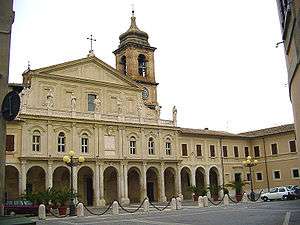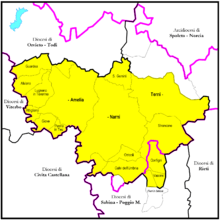Roman Catholic Diocese of Terni-Narni-Amelia
| Diocese of Terni-Narni-Amelia Dioecesis Interamnensis-Narniensis-Amerina | |
|---|---|
 Terni Cathedral | |
| Location | |
| Country | Italy |
| Ecclesiastical province | Immediately subject to the Holy See |
| Statistics | |
| Area | 871 km2 (336 sq mi) |
| Population - Total - Catholics |
(as of 2010) 157,900 156,100 (98.9%) |
| Parishes | 82 |
| Information | |
| Denomination | Catholic Church |
| Rite | Roman Rite |
| Established | 2nd century |
| Cathedral | Cattedrale di S. Maria Assunta (Terni) |
| Co-cathedral |
Concattedrale di S. Giovenale (Narni) Concattedrale di S. Firmina (Amelia) |
| Current leadership | |
| Pope | Francis |
| Bishop | Bishop-elect Giuseppe Piemontese |
| Map | |
 | |
| Website | |
| www.diocesi.terni.it | |
The diocese of Terni-Narni-Amelia (Latin: Dioecesis Interamnensis-Narniensis-Amerina) is a Roman Catholic ecclesiastical territory in Umbria, central Italy. It was created in 1983, when the Diocese of Amelia was united to the Diocese of Terni e Narni. The latter had been in turn created in 1907, when the Diocese of Narni was united to the historical Diocese of Terni.[1][2] The diocese is exempt, i.e. immediately subject to the Holy See, not part of any ecclesiastic province.
History
Terni is the ancient Interamna Nahars of the Umbrians, and the cathedral, and other churches, are built on the sites of pagan temples. After the Lombard invasion, Terni belonged to the Duchy of Spoleto, and with the latter, came into the Pontifical States. It was at Terni that Pope Zacharias entered into the agreement with King Luitprand for the restitution of the cities of Bieda, Orte, Bomarzo, and Amelia to the Duchy of Rome.
It is believed that the gospel was preached at Terni by Saint Peregrinus, about the middle of the second century. Saint Valentinus has a basilica outside the city. There were other martyrs from this city, among them Saints Proculus, Ephebus, Apollonius, and the holy virgin Agape.
In the time of Totila, the Bishop of Terni, Saint Proculus, was killed at Bologna, and Saint Domnina and ten nuns, her companions, were put to death at Terni itself. After the eighth century Terni was without a bishop until 1217, in which year the diocese was re-established.
Among its bishops were:
- Ludovico Mazzanco III (1406), who governed the diocese for fifty-two years;
- Francesco Coppini (1458–1462), papal legate to England during the Wars of the Roses
- Cosmas Manucci (1625), who gave the high altar to the cathedral;
- Francesco Rapaccioli (1646), a cardinal who restored the cathedral.[3]
- Franco Gualdrini (1983–2000)
- Vincenzo Paglia (2000–2012)
- Giuseppe Piemontese (2014–present)
Among its saints:
- Saint Valentine (176-273), the third bishop of Terni 197-273. A friend and protector of those in love.
- Blessed Lucy of Narni (1476–1544), spiritual adviser to the Duke of Ferrara, Ercole I d'Este, 1499-1505.
Ordinaries
Diocese of Terni
Latin Name: Interamnensis
Erected: 2nd Century
- Ludovico Antoniis (4 Apr 1463 - 7 Feb 1472 Died)
- Francesco Maria Scelloni, O.F.M. (14 Feb 1472 - 31 Aug 1472 Appointed, Bishop of Viterbo e Tuscania)
- Tommaso Vincenzi (31 Aug 1472 - 29 May 1475 Appointed, Bishop of Pesaro)
- Barnaba Mersoni (29 May 1475 - 1481 Died)
- Giovanni Romano, O.P. (1481 - 1485 Died)[4]
- Orso Orsini (1485 - 1485 Died)
- Francesco Maria Scelloni, O.F.M. (1491 - )
- Giovanni di Fonsalida (1 Oct 1494 - 1498 Died)[5]
- Francisco Lloris y de Borja (19 Mar 1498 - 17 Apr 1499 Resigned)
- Ventura Bufalini (17 Apr 1499 - 15 Aug 1504 Died)[6]
- Francisco Lloris y de Borja (4 Dec 1504 - 22 Jul 1506 Died)
- Pietro Bodoni (29 Jul 1506 - 1509 Died)
- Luigi d'Apera (7 Sep 1509 - 1520 Died))[7]
- Pompeo Colonna (14 May 1520 - 5 Dec 1520 Resigned)
- Sebastiano Valenti (5 Dec 1520 - 1553 Died)[8]
- Giovanni Giacomo Barba, O.S.A. (3 Jul 1553 - 1 Oct 1565 Died)[9]
- Tommaso Scotti, O.P. (6 Mar 1566 - 22 May 1566 Died)
- Muzio Calini (12 Jul 1566 - Apr 1570 Died)
- Bartolomeo Ferro, O.P. (10 May 1570 - Jan 1581 Died)
- Girolamo Petroni (16 Jan 1581 - 1591 Died)
- Giovanni Antonio Onorati (20 Nov 1591 - 1606 Died)[10]
- Ludovico Riva (Ripa) (24 Apr 1606 - 8 Sep 1613 Died)
- Clemente Gera (13 Nov 1613 (21 May 1625 Appointed, Bishop of Lodi)
- Cosimo Mannucci (9 Jun 1625 - 31 May 1634 Died)
- Ippolito Andreassi, O.S.B. (11 Apr 1639 - Oct 1646 Died)
- Francesco Angelo Rapaccioli (18 Oct 1646 - 29 May 1656 Resigned)
- Sebastiano Gentili (29 May 1656 - 3 Aug 1667 Resigned)
- Pietro Lanfranconi, O.S.A. (3 Aug 1667 - 6 Mar 1674 Died)
- Carlo Bonafaccia (27 May 1675 - 18 Oct 1683 Died)[11]
- Sperello Sperelli (10 Jan 1684 - 14 Dec 1698 Resigned)
- Cesare Sperelli (19 Dec 1698 - 11 Dec 1720 Resigned)
- Teodoro Pongelli (Pungelli) (20 Jan 1721 - 3 May 1748 Resigned)
- Cosimo Pierbenedetto Maculani, C.O. (6 May 1748 - 6 Oct 1767 Died)
- Agostino Felice de’ Rossi (25 Jan 1768 - 24 Sep 1788 Died)
- Carlo Benigni (27 Jun 1796 - 12 Apr 1822 Died)
- Domenico Armellini (2 Dec 1822 - 17 Dec 1828 Died)
- Niccola Mazzoni (21 May 1829 - 11 Nov 1842 Died)
- Vincenzo Tizzani, C.R.L. (3 Apr 1843 - 14 Nov 1848 Resigned)
- Nicola Abrate (1848 - 1849 Died)
- Antonio Magrini (11 Dec 1848 - 18 Mar 1852 Appointed, Bishop of Forli)
- Giuseppe Maria Severa (12 Sep 1853 - 4 Aug 1870 Died)
- Antonio Belli (27 Oct 1871 - 2 Sep 1897 Retired)
- Francesco Bacchini (5 Mar 1898 - 11 Dec 1905 Resigned)
Diocese of Terni e Narni
Latin Name: Interamnensis et Narniensis
United: 12 April 1907 with the Diocese of Narni
Immediately Subject to the Holy See
- Francesco Moretti (12 Apr 1907 - 7 Mar 1921 Resigned)
- Cesare Boccoleri (13 Jun 1921 - 28 Mar 1940 Appointed, Archbishop of Modena (e Nonantola))
- Felice Bonomini (28 Aug 1940 - 21 Nov 1947 Appointed, Bishop of Como)
- Giovanni Battista Dal Prà (6 Apr 1948 - 10 Feb 1973 Resigned)
- Santo Bartolomeo Quadri (10 Feb 1973 - 31 May 1983 Appointed, Archbishop of Modena (e Nonantola))
Diocese of Terni, Narni, e Amelia
Latin Name: Interamnensis, Narniensis et Amerinus
United: 13 September 1983 with the Diocese of Amelia
- Franco Gualdrini (14 Sep 1983 - 4 Mar 2000 Retired)
Diocese of Terni-Narni-Amelia
Latin Name: Interamnensis-Narniensis-Amerinus
Name Changed: 30 September 1986
- Vincenzo Paglia (4 Mar 2000 - 26 Jun 2012 Appointed, President of the Pontifical Council for the Family)
- Giuseppe Piemontese, O.F.M. Conv. (16 Apr 2014 - )
Notes
- ↑ "Diocese of Terni-Narni-Amelia" Catholic-Hierarchy.org. David M. Cheney. Retrieved February 29, 2016
- ↑ "Diocese of Terni–Narni–Amelia" GCatholic.org. Gabriel Chow. Retrieved February 29, 2016
- ↑ CATHOLIC ENCYCLOPEDIA: Narni and Terni
- ↑ "Bishop Giovanni Romano, O.P.". Catholic-Hierarchy.org. David M. Cheney. Retrieved 29 February 2016.
- ↑ "Bishop Giovanni di Fonsalida". Catholic-Hierarchy.org. David M. Cheney. Retrieved 29 February 2016.
- ↑ "Bishop Ventura Bufalini". Catholic-Hierarchy.org. David M. Cheney. Retrieved 29 February 2016.
- ↑ "Bishop Luigi d'Apera". Catholic-Hierarchy.org. David M. Cheney. Retrieved 29 February 2016.
- ↑ "Bishop Sebastiano Valenti". Catholic-Hierarchy.org. David M. Cheney. Retrieved 29 February 2016.
- ↑ "Bishop Giovanni Giacomo (Jean Jacques) Barba, O.S.A." Catholic-Hierarchy.org. David M. Cheney. Retrieved March 21, 2016
- ↑ "Bishop Giovanni Antonio Onorati" Catholic-Hierarchy.org. David M. Cheney. Retrieved March 21, 2016
- ↑ "Bishop Carlo Bonafaccia" Catholic-Hierarchy.org. David M. Cheney. Retrieved August 21, 2016
![]() This article incorporates text from a publication now in the public domain: Herbermann, Charles, ed. (1913). "article name needed". Catholic Encyclopedia. New York: Robert Appleton.
This article incorporates text from a publication now in the public domain: Herbermann, Charles, ed. (1913). "article name needed". Catholic Encyclopedia. New York: Robert Appleton.
External links
Coordinates: 42°34′N 12°39′E / 42.567°N 12.650°E